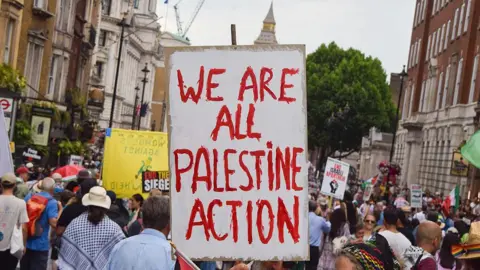The recent comments by Metropolitan Police Chief Sir Mark Rowley regarding a planned protest in support of Palestine Action have stirred considerable attention and concern. In a statement, Sir Mark expressed that he is “shocked and frustrated” by the upcoming demonstration scheduled in London. Adding weight to his concerns, he emphasized the delicate balance between the right to protest and the actions that could be deemed as going beyond what could be considered legitimate forms of activism. This statement has been positioned against the backdrop of a broader narrative concerning the UK’s governmental stance on pro-Palestinian activism amidst ongoing tensions in the Gaza region.
Currently, the home secretary is reportedly preparing a statement for Parliament to formally classify Palestine Action as a terrorist organization. This move would empower the government to restrict the group’s activities under counter-terrorism laws. The pressure on the home secretary appears urgent and perhaps a political response to the recent escalating actions by Palestine Action members, who, just days prior, vandalized military aircraft at RAF Brize Norton. This particular act, which saw the activists spraying red paint on the planes, served as a protest against the UK’s perceived complicity in supporting Israel amid the devastating conflict in Gaza.
The planned protest in central London is backed by a coalition of 35 organizations, involving various pro-Palestinian groups and notable entities like the Stop the War Coalition and Muslim Engagement and Development (MEND). Sir Mark has categorized Palestine Action as an “organized extremist criminal group,” which further complicates the legitimacy and legality of the planned protest. While he acknowledges the police’s inability to prevent the protest due to its current legal status, he has assured that measures will be in place to impose conditions that prevent disorder and serious disruptions.
As the situation develops, Palestine Action has rebutted the characterizations put forth by government officials. They argue that the political establishment is quick to label them as “terrorists” while glossing over what they believe are significant human rights violations. One prominent member of Palestine Action, Saeed Taji Farouky, claims that the proposed ban displays a troubling departure from fundamental principles of democracy and rule of law, asserting that citizens should be alarmed by such governmental actions.
The actions of Palestine Action, which have primarily targeted arms manufacturers due to the ongoing conflict, have drawn polarized reactions. Recently, the group claimed responsibility for painting a US military aircraft in Ireland. Farouky insisted that their operations respond to escalating violence in Gaza, which he directly attributed to a systematic genocide against the Palestinian people, a claim fiercely denied by the Israeli government.
Responses to the planned ban have elicited varied reactions within the political landscape. Prime Minister Sir Keir Starmer condemned the break-in at RAF Brize Norton as “disgraceful,” with counter-terrorism police actively investigating the incident. The potential proscription of Palestine Action has garnered endorsement from several politicians in Westminster, including former Home Secretary Suella Braverman. Meanwhile, Labour MP Zarah Sultana has voiced her opposition to the government’s heavy-handed approach, harkening back to the large-scale protests against the Iraq War, which similarly faced governmental disdain.
Moreover, advocacy groups like Amnesty International UK have expressed deep concern over the application of counter-terrorism regulations to suppress protests. This nuance reflects a growing tension between the government’s attempt to ensure security and the right of the public to peacefully express dissent.
In summary, the planned protest by Palestine Action, juxtaposed with the government’s inclination towards stricter legal measures against the group, highlights the ongoing divide over the issue of Palestinian rights and activism in the UK. As tensions simmer from Gaza to London, the implications of these actions, both for civil liberties and international relations, are yet to unfold. The interconnected web of activism, legal repercussions, and counter-statement from various groups underscores the complexities surrounding modern protests in politically charged landscapes.



